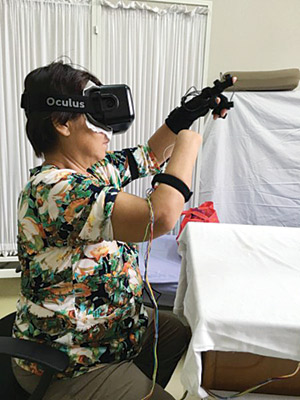By using virtual reality (VR) it is possible to create a simulated experience of being present in a 3D world where one can move around freely and touch and interact with objects. A new test devised by researchers at Aalborg University (AAU), Denmark, shows that VR technology can trick a person’s brain into thinking that it is still in control of a missing limb and thus can ease phantom limb pain.

A subject tests AAU’s VR method to relieve phantom limb pain at the China Rehabilitation Research Center. Photograph courtesy of Geng.
“The tactile representation of different body parts are arranged in the brain in a sort of map,” explained Bo Geng, PhD, with the AAU faculty of medicine. “If the brain no longer receives feedback from an area, it tries to reprogram its signal reception map. That is the most common conception of how phantom limb pain occurs.”
Tests have shown that phantom limb pain can be relieved if the brain is tricked into thinking that the amputated limb is still attached to the body. A mirror placed at an angle in front of the chest of a person with an upper-limb amputation can create the visual illusion that the body is symmetrical. If the person then pretends to do the same movements simultaneously with both hands, in many cases the brain can be convinced that it is in contact with an amputated hand. The method has proven effective in numerous people with amputations and is the foundation for a new method that has been developed by Geng in collaboration with Martin Kraus, Dr. rer. nat. in computer science, and master’s degree students Bartal Henriksen and Ronni Nedergaard Nielsen from the medialogy program at Aalborg University.
In the new method, the patient wears VR goggles and a glove on the intact hand, and small electrodes are placed on the residual limb. By stimulating the residual limb with tiny electrical impulses, researchers try to re-create the sensation of the phantom hand. The patient plays different VR games that involve doing the same thing with both hands, such as grabbing a pole that has to be twisted into different shapes or pushing virtual buttons. In VR, the patient feels as if he or she is using both hands.
“Even though a person who has had a hand amputated can no longer see it, in many cases he or she can still feel it. This sensory conflict may be interpreted by the brain as pain. With this new method, we try to overcome that conflict by providing an artificial visual and tactile feedback and in that way suppress the pain,” said Geng.
The new approach underwent its first clinical test at the China Rehabilitation Research Center, Beijing, last fall. Two of three test subjects reported that they felt their phantom limb pain ease, and the third subject experienced a decrease in the frequency of phantom limb pain attacks.
“Of course, we need to do more tests, but the results so far look promising,” Geng said.
Students at AAU are developing a version of the system for people who have lower-limb amputations.
Editor’s note: This story was adapted from materials provided by AAU and ScienceDaily.



